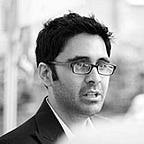The Tension of True Leadership
Moving and Acting
You know it, I know it. The world is in the midst of a profound leadership crisis. We excel at mass producing worker bees, brainstorming middle managers, heartless execs, glib politicians. But true leaders? They’re as elusive today as an oasis in the endless desert of global economic stagnation, social fracture, and political disorder.
In this essay, I’ll contrast two essential qualities of genuine leaders, that create the great tension that drives leaders forward. I’ll use the contentious example of America. Not to judge, but just to gently observe.
Genuine Values
Leaders today – people today – think they have values. Throw a rock, find a value. Bzzt. They don’t.
Genuine values are three things. Universal, transcendent, and unconditional. They are what you believe every member of a human organisation, whether a corporation, society, or global political economy, should have. Without question.
Every member. Every soul. Every human life. Not just what the rich and fortunate can acquire, buy, earn, win. Nor what anyone “deserves”. But merely what is owed by all to one, for the reality of human possibility.
Who was the last American leader that really had genuine values? Not Trump, obviously. He doesn’t believe everyone should have anything. But Hillary doesn’t either. For example, she could believe that everyone should have unconditional healthcare, shelter, savings. But I think it’s fair to say that’s not the case.
The last American leaders to have genuine values were probably FDR and Lincoln. FDR proposed a now famed second bill of rights, that included rights to education, social care, and so on. Lincoln of course was uncompromising in his belief that all people deserve freedom unconditionally.
That lack of genuine goes a very long way towards explaining America’s current historic problems. If you don’t believe there’s anything everyone should have, then of course there is no real basis for a working organisation, like a society, anymore. It’s just an arena for gladiatorial combat, where the strongest win – and everyone else is forced to fight.
Open Minds
If you don’t believe everyone should have anything, what are you, in the purest terms? You are a nihilist, not a leader.
Nihilists are ideologues. Ideologues are prisoners of dead ideas.
Having genuine values gives us true openness of mind. Let me use my own example.
I’m a conservative. I value freedom, beauty, and goodness, above all. I don’t think money is the end of human existence.
But.
I take a hard look a around the world and I see a stagnant global economy. Instantly, I know: now is the time for governments to invest and save the lives that are going to waste.
In other, I am able to override my ideology. Switch it, change it, move it, flex it. It doesn’t control me, I control it. That’s what it should be, right? A tool, a means. Not an end in itself.
Why am I able to override my ideology? Because I know that right now, this historical moment, this special circumstance, my ideology isn’t going to lead to the genuine values I hold. People aren’t going to live more beautiful and good lives if governments don’t invest. Tomorrow, that may change. That’s the point. Now I’m really open minded, right? I can change my mind.
Values are the ends. Ideologies, which are sets of tools, are merely means.
But our not-quite-leaders today have this relationship exactly backwards. They are ideological prisoners, mental captives to dead ideas. Why? They don’t have genuine values to begin with, remember?
So there’s nothing to flex, move, change, for. There’s no reason for them to change their minds. They never have. For that reason it’s eminently fair to call most of them brain-dead.
This tension between genuine values and openness of mind is the defining characteristic of true leadership. It is a great tension. Like balancing on a high wire, it compels us to act. Or else we fall.
Without this tension, leaders never develop any of the following:
- Curiosity
- Empathy
- Courage
- Responsibility
- Defiance
- Creativity
Why should they? There’s no reason for them to, remember? It’s only when your ideology is failing to enact your values that you grow curious. Why, you ask. Then you show a little bit of courage in defying it, and it’s acolytes.
You begin to understand that true responsibility isn’t just to your ideology – but to your values. And finally, you develop creativity by going beyond mere ideology, creating truly novel ways to bring your genuine values to fruition.
Our leaders today aren’t quite capable of any of that. The tension of real leadership isn’t in them. That is why they aren’t crossing the high wire, but falling off it – and taking us down with them.
We desperately need not just better but truer ones.
Here’s hoping that’s you.
Umair
Philadelphia
September 2016
